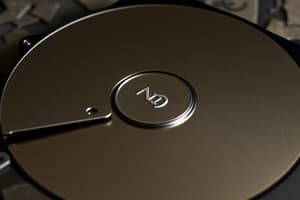Podcast
Questions and Answers
What is a major disadvantage of using magnetic tape drives as storage devices?
What is a major disadvantage of using magnetic tape drives as storage devices?
- They are exceptionally expensive compared to hard disk drives.
- Their data transfer rate is significantly slower than other storage media.
- They are susceptible to damage from strong magnetic fields. (correct)
- They can only store limited amounts of data, making them unsuitable for large-scale backup.
Which of the following is NOT a common use case scenario for fixed hard disk drives?
Which of the following is NOT a common use case scenario for fixed hard disk drives?
- Archiving large volumes of data for extended periods (correct)
- Serving as primary storage for online gaming platforms
- Storing application files for various programs installed on the computer
- Storing system software and operating systems
What is the primary advantage of using a portable hard drive over a fixed hard drive for data storage?
What is the primary advantage of using a portable hard drive over a fixed hard drive for data storage?
- Portable hard drives are more resistant to physical damage than fixed hard drives.
- Portable hard drives have significantly faster data transfer rates compared to fixed hard drives.
- Portable hard drives offer a greater storage capacity than fixed hard drives.
- Portable hard drives enable easy data transfer between different computers. (correct)
In which of the following applications is magnetic tape storage still considered a practical and often preferred choice?
In which of the following applications is magnetic tape storage still considered a practical and often preferred choice?
Which of these is a primary reason for backing up data regularly?
Which of these is a primary reason for backing up data regularly?
What is a key difference between magnetic and optical storage media in terms of how data is stored?
What is a key difference between magnetic and optical storage media in terms of how data is stored?
What is the primary disadvantage of using portable hard drives for storing data?
What is the primary disadvantage of using portable hard drives for storing data?
What is a key advantage of using fixed hard drives for storing data?
What is a key advantage of using fixed hard drives for storing data?
Which type of optical media is the most suitable for storing large movie files due to its high storage capacity and fast data transfer rate?
Which type of optical media is the most suitable for storing large movie files due to its high storage capacity and fast data transfer rate?
Which of these is a significant advantage offered by Solid State Drives (SSDs) over traditional Hard Disk Drives (HDDs)?
Which of these is a significant advantage offered by Solid State Drives (SSDs) over traditional Hard Disk Drives (HDDs)?
What is a potential disadvantage of using CD-RW/DVD-RW media for data storage?
What is a potential disadvantage of using CD-RW/DVD-RW media for data storage?
What is a key advantage of using CD-ROM/DVD-ROM media?
What is a key advantage of using CD-ROM/DVD-ROM media?
Which of these is a potential disadvantage of using Blu-ray technology for data storage?
Which of these is a potential disadvantage of using Blu-ray technology for data storage?
Which type of media is best suited for high-definition video recording and playback due to its large storage capacity and fast data transfer rate?
Which type of media is best suited for high-definition video recording and playback due to its large storage capacity and fast data transfer rate?
What makes Solid State Drives (SSDs) more reliable than traditional Hard Disk Drives (HDDs)?
What makes Solid State Drives (SSDs) more reliable than traditional Hard Disk Drives (HDDs)?
Which of these types of media is commonly used as a security device to prevent software piracy?
Which of these types of media is commonly used as a security device to prevent software piracy?
What is a significant disadvantage of using Pen Drives (Memory Sticks) for data storage?
What is a significant disadvantage of using Pen Drives (Memory Sticks) for data storage?
Which of these media types is commonly used to store photos on digital cameras?
Which of these media types is commonly used to store photos on digital cameras?
What is a potential disadvantage of using Flash Memory cards for data storage?
What is a potential disadvantage of using Flash Memory cards for data storage?
What is the fundamental difference between CD-RW and DVD-RW media?
What is the fundamental difference between CD-RW and DVD-RW media?
What was a significant factor in the decline of Blu-ray's popularity for home video?
What was a significant factor in the decline of Blu-ray's popularity for home video?
Why are SSDs considered more energy-efficient compared to traditional HDDs?
Why are SSDs considered more energy-efficient compared to traditional HDDs?
What is a key advantage of using memory sticks (pen drives) compared to CD-RW or DVD-RW media?
What is a key advantage of using memory sticks (pen drives) compared to CD-RW or DVD-RW media?
Which of these types of media is most susceptible to accidental data loss due to physical damage, particularly being dropped or exposed to extreme temperatures?
Which of these types of media is most susceptible to accidental data loss due to physical damage, particularly being dropped or exposed to extreme temperatures?
Flashcards
Backing Up Data
Backing Up Data
Copying files to a different medium to prevent data loss.
Magnetic Backing Storage Media
Magnetic Backing Storage Media
Stores data magnetically on a magnetised surface.
Magnetic Tape Drives
Magnetic Tape Drives
Used for storing vast amounts of data for backup and archiving.
Advantages of Magnetic Tape Drives
Advantages of Magnetic Tape Drives
Signup and view all the flashcards
Fixed Hard Disks/Drives
Fixed Hard Disks/Drives
Signup and view all the flashcards
Advantages of Fixed Hard Disks
Advantages of Fixed Hard Disks
Signup and view all the flashcards
Portable Hard Disk Drives
Portable Hard Disk Drives
Signup and view all the flashcards
Optical Media
Optical Media
Signup and view all the flashcards
CD-R/DVD-R
CD-R/DVD-R
Signup and view all the flashcards
Advantages of CD-R/DVD-R
Advantages of CD-R/DVD-R
Signup and view all the flashcards
Disadvantages of CD-R/DVD-R
Disadvantages of CD-R/DVD-R
Signup and view all the flashcards
CD-RW/DVD-RW
CD-RW/DVD-RW
Signup and view all the flashcards
Advantages of CD-RW/DVD-RW
Advantages of CD-RW/DVD-RW
Signup and view all the flashcards
Disadvantages of CD-RW/DVD-RW
Disadvantages of CD-RW/DVD-RW
Signup and view all the flashcards
CD-ROM/DVD-ROM
CD-ROM/DVD-ROM
Signup and view all the flashcards
Advantages of CD-ROM/DVD-ROM
Advantages of CD-ROM/DVD-ROM
Signup and view all the flashcards
Disadvantages of CD-ROM/DVD-ROM
Disadvantages of CD-ROM/DVD-ROM
Signup and view all the flashcards
Blu-Ray Discs
Blu-Ray Discs
Signup and view all the flashcards
Blu-Ray Advantages
Blu-Ray Advantages
Signup and view all the flashcards
SSD (Solid State Drive)
SSD (Solid State Drive)
Signup and view all the flashcards
Pen Drives
Pen Drives
Signup and view all the flashcards
Memory Cards
Memory Cards
Signup and view all the flashcards
Disadvantages of Flash Memory Cards
Disadvantages of Flash Memory Cards
Signup and view all the flashcards
Study Notes
Backing Up Data
- Backing up data involves creating copies of files on a different storage medium to protect against loss or damage.
- Reasons for backing up data include safeguarding against data loss, hacker attacks, and preserving file formats for transfer.
Magnetic Backing Storage Media
- Magnetic media stores data using magnetization on a surface.
- Data is read by sensing the magnetized bits.
- Magnetic tape drives excel at batch processing, backups of large datasets, and long-term data archiving.
Magnetic Tape Drives
- Uses: Batch processing, large-scale backups, long-term archiving.
- Advantages: Lower cost, robust technology, high storage capacity, fast data transfer.
- Disadvantages: Slow access times (serial access), updating requires additional tapes, susceptible to magnetic fields.
Fixed Hard Disks/Drives
- Uses: Operating system, system software, working data, applications.
- Advantages: High data transfer rate, fast access, large capacity.
- Disadvantages: Susceptible to damage, moving parts impact reliability, noisy read/write operations.
Portable Hard Disk Drives
- Uses: Backup systems, data/file transfers.
- Advantages: Fast data access, high capacity, transfer between computers.
- Disadvantages: Prone to damage from drops or improper shutdowns, slower transfer than fixed drives.
Optical Media and Optical Storage Devices
- Optical media stores data by burning "dots" using lasers.
- Data is read by a lower-powered laser detecting these "dots."
CD-R/DVD-R (Write Once Only)
- Uses: Home recordings (music/films), data transfer for long-term storage.
- Advantages: Less expensive than rewritable media, permanent storage after burning.
- Disadvantages: Single use, error leads to discarding the disk, not all players read them.
CD-RW/DVD-RW (Read and Write)
- Uses: Recording TV programs repeatedly, CCTV systems, file/data backups.
- Advantages: Reusable, multiple file formats, no waste.
- Disadvantages: Relatively expensive media, risk of accidental overwriting.
CD-ROM/DVD-ROM (Read Only Memory)
- Uses: Read-only storage for music, software, films, preventing data alteration.
- Advantages: Cheaper than hard drives, portable, can't be overwritten.
- Disadvantages: Less storage than hard drives, slow speed, no file addition.
Blu-Ray Discs
- Key Differences from DVDs: Uses a blue laser (smaller wavelength for higher data density), secure encryption, higher data transfer rate.
- Uses: Home video consoles, movie storage, computer backups, camcorders.
- Advantages: High capacity, fast data transfer, fast access.
- Disadvantages: Expensive discs, encryption challenges, HD DVDs reduce advantage.
Solid State Backing Storage
- Solid-state devices (SSDs) store data without moving parts.
Solid-State Drives (SSDs)
- Uses: General file, application, and operating system storage.
- Advantages: Reliable (no moving parts), portable (lightweight and compact), fast start-up, efficient power usage, cool operation.
- Disadvantages: Relatively expensive, lower storage capacity (compared to magnetic drives), limited write endurance.
Pen Drives (Memory Sticks)
- Uses: Data transport, software/security dongles.
- Advantages: Portable, robust, easy use.
- Disadvantages: No read-only protection, easily lost and damaged, incorrect removal risks data loss.
Flash Memory Cards
- Types: SD, XD, CFast.
- Uses: Cameras, phones, MP3 players, handheld devices.
- Advantages: Portable, durable, high capacity, transfer data between devices.
- Disadvantages: Expensive per gigabyte compared to hard drives, limited capacity, finite write/read life, risk of loss or damage.
Studying That Suits You
Use AI to generate personalized quizzes and flashcards to suit your learning preferences.



